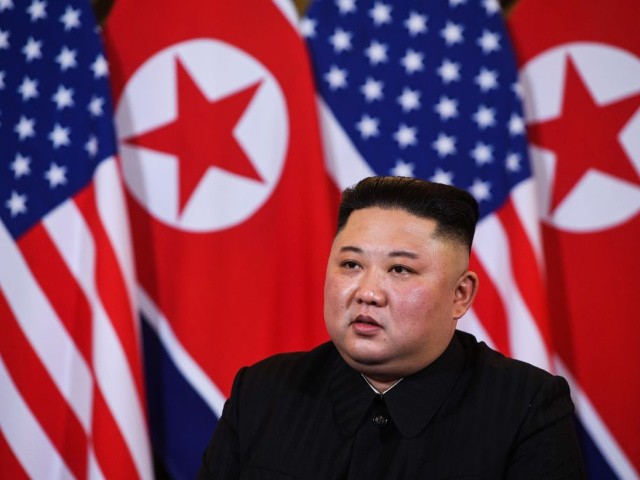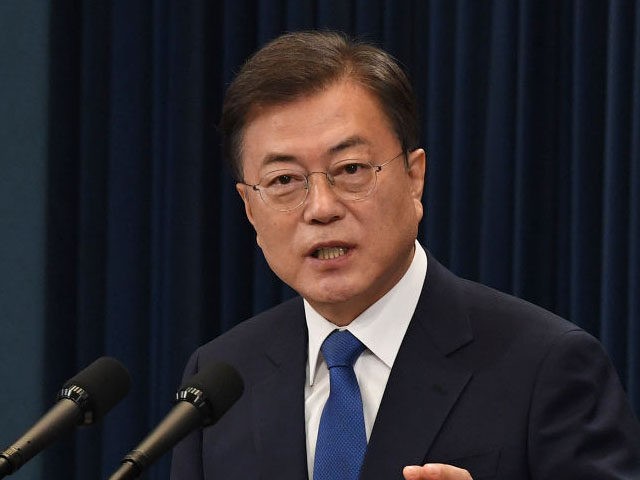Leftist South Korean President Moon Jae-in claimed on Monday that all parties to the Korean War – the two Koreas, China, and America – agree “in principle” to ending the more than 70-year war.
The Korean War began in 1950 and resulted in the creation of two Korean states: free South Korea and communist North Korea. America and China fought on the sides of the South and the North, respectively, against each other for the active period of the war. In 1953, all parties signed an armistice agreement that ended active hostilities and created the “Demilitarized Zone” (DMV), the highly policed border between the two Koreas. None of the parties to the conflict ever signed a peace treaty, however, so technically all remain at war.
North Korea has for years, with China’s backing, added increasingly absurd demands to even considering signing a peace agreement, including for the United States and South Korea to stop opposing the rogue regime’s quest to obtain nuclear weapons.
According to the South Korean news agency Yonhap, Moon said during a visit to Australia on Monday that “the United States, China and North Korea agree in principle on declaring a formal end to the 1950-53 Korean War and Seoul will push to make it happen.” Yonhap did not add any clarity regarding what he meant by “in principle” but noted that Moon said that “he believes an end-of-war declaration will help revive stalled talks between South and North Korea and between North Korea and the U.S.”

North Korean soldiers hand over remains of U.S servicemen killed during the Korean War to United Nations honor guards at the Military Demarcation Line dividing Panmunjom (CHOO YOUN-KONG/AFP/Getty Images).
Last week, South Korea’s JoongAng Ilbo reported, citing an unnamed member of the Moon administration, that Seoul had, indeed, contacted Pyongyang about potentially hashing out a peace agreement among the four Korean War participants. The newspaper broke that South Korea had restored communication with its communist neighbor, which ended abruptly last year when North Korea bombed the liaison office in Kaesong, North Korea, typically used for such bilateral communications.
The unnamed “high-ranking” Moon official also claimed, “South Korea and the United States are in the final stage of coordination over the text for an end-of-war declaration, but it is not completed and still in progress.”
“During the coordination process between South Korea and the United States over the declaration’s text, we have continued to communicate with North Korea,” the anonymous source claimed, insisting they could not offer any more details about the method of communication between the two Koreas other than the fact that it has not occurred between Moon at North Korean dictator Kim Jong-un.
In tandem with Moon confirming attempts to issue a peace declaration on Monday, the head of South Korea’s National Intelligence Service, Park Jie-won, suggested that bribing North Korea with Chinese coronavirus vaccines may help facilitate the process.
“I believe that if the U.S. rather more audaciously proposes providing its vaccines, momentum could be created to bring North Korea back to talks,” Park said at a forum, according to Yonhap. Park blamed the pandemic, which originated in China, for making communication with North Korea difficult in general.
North Korea shut its border entirely in 2020 to prevent the disease from entering, even cutting off the typically open Yalu River border and suppressing the sanctions-violating trade with China that keeps the country afloat. General Robert B. Abrams, commander of U.S. Forces Korea (USFK), said last year that North Korea issued “shoot-to-kill” orders for soldiers along the border to ensure no one from outside of the country enters.
North Korea claims officially to have documented zero cases of the Chinese coronavirus but has demanded the international community provide it vaccines against a disease it claims does not exist in the country. Bizarre incidents such as a tearful apology to the Korean people issued by Kim personally last year have led experts to believe that North Korea is, in reality, suffering from an uncontrolled spread of the virus, which poses a particular threat to the country’s famished and poorly medicated population.
Park, the South Korean intelligence chief, suggested that America should consider lifting sanctions on communist officials – most of them imposed in response to egregious human rights crimes or to North Korea’s illegal nuclear program – to bring Pyongyang back to the negotiating table.
President Joe Biden has not informed the public that he has any North Korea foreign policy whatsoever. At the beginning of his term, Biden assigned his officials to reach out to the North Korean regime and seek to establish communication. Pyongyang soundly ignored the White House, clarifying in March that it had done so intentionally and calling Biden’s North Korea policy “lunatic.”
“The U.S. has tried to contact us since mid-February through several routes including New York,” Choe Son Hui, first vice-minister of Foreign Affairs, boasted at the time, confirming North Korea received the messages and chose not to answer. “It recently requested to contact us by sending e-mails and telephone messages via various routes. Even in the evening before the joint military drill it sent a message imploring us to respond to its request through a third country.”
Biden, a longstanding figure in American politics, has long been the target of ire from North Korean state media. Most prominently, in 2019, a North Korean state propaganda outlet called Biden a “rabid dog” and declared he “must be beaten to death with a stick as quickly as possible.”

North Korea’s leader Kim Jong-un during a meeting at the Sofitel Legend Metropole hotel in Hanoi on February 27, 2019 (SAUL LOEB/AFP/Getty Images).
After making no moves regarding North Korea policy since Biden’s inauguration, the U.S. implemented a new round of sanctions against North Korean officials this week. The sanctions targeted 15 senior North Korean officials and ten entities within the country for participating in “human rights abuse and repression in several countries around the globe.”

COMMENTS
Please let us know if you're having issues with commenting.